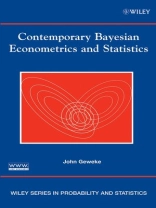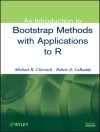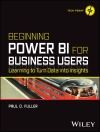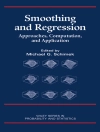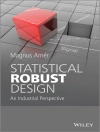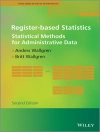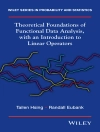Tools to improve decision making in an imperfect world
This publication provides readers with a thorough understanding of Bayesian analysis that is grounded in the theory of inference and optimal decision making. Contemporary Bayesian Econometrics and Statistics provides readers with state-of-the-art simulation methods and models that are used to solve complex real-world problems. Armed with a strong foundation in both theory and practical problem-solving tools, readers discover how to optimize decision making when faced with problems that involve limited or imperfect data.
The book begins by examining the theoretical and mathematical foundations of Bayesian statistics to help readers understand how and why it is used in problem solving. The author then describes how modern simulation methods make Bayesian approaches practical using widely available mathematical applications software. In addition, the author details how models can be applied to specific problems, including:
* Linear models and policy choices
* Modeling with latent variables and missing data
* Time series models and prediction
* Comparison and evaluation of models
The publication has been developed and fine- tuned through a decade of classroom experience, and readers will find the author’s approach very engaging and accessible. There are nearly 200 examples and exercises to help readers see how effective use of Bayesian statistics enables them to make optimal decisions. MATLAB? and R computer programs are integrated throughout the book. An accompanying Web site provides readers with computer code for many examples and datasets.
This publication is tailored for research professionals who use econometrics and similar statistical methods in their work. With its emphasis on practical problem solving and extensive use of examples and exercises, this is also an excellent textbook for graduate-level students in a broad range of fields, including economics, statistics, the social sciences, business, and public policy.
Tabla de materias
Preface.
1. Introduction.
1.1 Two Examples.
1.1.1 Public School Class Sizes.
1.1.2 Value at Risk.
1.2 Observables, Unobservables, and Objects of Interest.
1.3 Conditioning and Updating.
1.4 Simulators.
1.5 Modeling.
1.6 Decisionmaking.
2. Elements of Bayesian Inference.
2.1 Basics.
2.2 Sufficiency, Ancillarity, and Nuisance Parameters.
2.2.1 Sufficiency.
2.2.2 Ancillarity.
2.2.3 Nuisance Parameters.
2.3 Conjugate Prior Distributions.
2.4 Bayesian Decision Theory and Point Estimation.
2.5 Credible Sets.
2.6 Model Comparison.
2.6.1 Marginal Likelihoods.
2.6.2 Predictive Densities.
3. Topics in Bayesian Inference.
3.1 Hierarchical Priors and Latent Variables.
3.2 Improper Prior Distributions.
3.3 Prior Robustness and the Density Ratio Class.
3.4 Asymptotic Analysis.
3.5 The Likelihood Principle.
4. Posterior Simulation.
4.1 Direct Sampling, .
4.2 Acceptance and Importance Sampling.
4.2.1 Acceptance Sampling.
4.2.2 Importance Sampling.
4.3 Markov Chain Monte Carlo.
4.3.1 The Gibbs Sampler.
4.3.2 The Metropolis–Hastings Algorithm.
4.4 Variance Reduction.
4.4.1 Concentrated Expectations.
4.4.2 Antithetic Sampling.
4.5 Some Continuous State Space Markov Chain Theory.
4.5.1 Convergence of the Gibbs Sampler.
4.5.2 Convergence of the Metropolis–Hastings Algorithm.
4.6 Hybrid Markov Chain Monte Carlo Methods.
4.6.1 Transition Mixtures.
4.6.2 Metropolis within Gibbs.
4.7 Numerical Accuracy and Convergence in Markov Chain Monte Carlo.
5. Linear Models.
5.1 BACC and the Normal Linear Regression Model.
5.2 Seemingly Unrelated Regressions Models.
5.3 Linear Constraints in the Linear Model.
5.3.1 Linear Inequality Constraints.
5.3.2 Conjectured Linear Restrictions, Linear Inequality Constraints, and Covariate Selection.
5.4 Nonlinear Regression.
5.4.1 Nonlinear Regression with Smoothness Priors.
5.4.2 Nonlinear Regression with Basis Functions.
6. Modeling with Latent Variables.
6.1 Censored Normal Linear Models.
6.2 Probit Linear Models.
6.3 The Independent Finite State Model.
6.4 Modeling with Mixtures of Normal Distributions.
6.4.1 The Independent Student-t Linear Model.
6.4.2 Normal Mixture Linear Models.
6.4.3 Generalizing the Observable Outcomes.
7. Modeling for Time Series.
7.1 Linear Models with Serial Correlation.
7.2 The First-Order Markov Finite State Model.
7.2.1 Inference in the Nonstationary Model.
7.2.2 Inference in the Stationary Model.
7.3 Markov Normal Mixture Linear Model.
8. Bayesian Investigation.
8.1 Implementing Simulation Methods.
8.1.1 Density Ratio Tests.
8.1.2 Joint Distribution Tests.
8.2 Formal Model Comparison.
8.2.1 Bayes Factors for Modeling with Common Likelihoods.
8.2.2 Marginal Likelihood Approximation Using Importance Sampling.
8.2.3 Marginal Likelihood Approximation Using Gibbs Sampling.
8.2.4 Density Ratio Marginal Likelihood Approximation.
8.3 Model Specification.
8.3.1 Prior Predictive Analysis.
8.3.2 Posterior Predictive Analysis.
8.4 Bayesian Communication.
8.5 Density Ratio Robustness Bounds.
Bibliography.
Author Index.
Subject Index.
Sobre el autor
JOHN GEWEKE, PHD, is Harlan Mc Gregor Chair in Economic Theory and Professor of Economics and Statistics at the University of Iowa. He is an elected Fellow of the Econometric Society and the American Statistical Association, former President of the International Society for Bayesian Analysis, and coeditor of the Journal of Econometrics.
